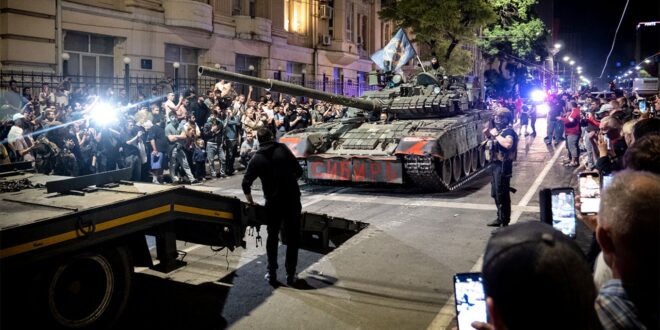Anna, a 67-year-old woman from the southern city of Rostov-on-Don, remembers being woken up by the sounds of military equipment early in the morning of June 24.
From her window, she could see a tank, armored vehicles and machine gunners of the Wagner private military company sitting opposite her house, surrounding one of the Russian military’s main command centers for its war in Ukraine.
“I started reading the news and realized that while I was sleeping, the center of the city was captured by Wagner’s mercenaries. It wasn’t crowded on the street yet, although some people came up and looked at them curiously,” Anna told The Moscow Times, requesting anonymity out of safety concerns.
“After a few hours, I decided that my family and I needed to leave immediately,” she added.
The Wagner Group’s mutiny against Russia’s military leadership saw its forces occupy the center of Rostov-on-Don, a city of 1 million, for 24 hours with barely any resistance.
Many observers took this — and scenes of residents cheering for Wagner fighters as they ended their mutiny — as a sign that Wagner leader Yevgeny Prigozhin could pose a credible threat to President Vladimir Putin’s hold on power.
Local residents and analysts who spoke to The Moscow Times told a different story — one in which much of the support for Wagner and Prigozhin in Rostov-on-Don was passive rather than active.
After Prigozhin announced his “march of justice” to Moscow, many Rostov-on-Don residents panicked and tried to flee the city, and supermarket shelves with essential goods quickly started to empty.
However, despite the authorities’ requests for residents not to leave their homes, many citizens’ anxiety turned into curiosity by midday.
Locals flocked to the city center to see what was happening, a journalist from a local Rostov-based media outlet who was at the scene of the events told The Moscow Times. She also requested anonymity. Сitizens took pictures with the mercenaries and treated them to food from nearby cafes, while some girls even tried to meet them for a date, she said.
A number of Rostov residents who spoke to The Moscow Times said they knew people who expressed sympathy for Prigozhin, believing that he was not afraid to tell the truth, while the Defense Ministry suppressed news of defeats on the frontline and problems in the army.
“My friends reacted positively to what was happening, hoping for changes in the country. They liked that there was finally a person who was not afraid to go against Putin,” said Anastasia, 25, who works at a construction company.
Although Prigozhin did not call on the military to switch sides, had his mutiny been successful, some military personnel would have supported Wagner, an officer from Rostov-on-Don told The Moscow Times on condition of anonymity.
“The military has an ambivalent attitude toward Prigozhin. There are those who idolize him for telling the truth about the problems in the army, while others treat him as a charlatan running a gang of criminals,” the officer said, referring to Wagner’s recruitment of convicts from Russian prisons.
“Several of my fellow officers who were in the city center on the day of the mutiny spoke positively about the behavior of guys from Wagner. Mercenaries waved to them, greeted them, expressed respect, and they were quite friendly,” the officer added.
The Rostov-based journalist told The Moscow Times that for many locals, the presence of mercenaries in the city was a kind of spectacle.
“I talked to a lot of people on the street. They were sure that this rebellion was just a farce, and that Putin would soon resolve everything,” she said.
On the evening of June 24, the Rostov-based media 161.ru published a video in which citizens of Rostov applaud a mercenary, chanting: “Wagner!” Some of them shook hands with Prigozhin through the window of the SUV in which he was leaving the city.
The governor of the Rostov region, Vasily Golubev, claimed that the public displays of support for Wagner were staged by mercenaries disguised in civilian clothes.
Nevertheless, residents’ reactions should not be viewed as genuine support for Prigozhin’s rebellion, said Denis Volkov, head of the independent Levada Center polling agency.
“Prigozhin was perceived as a defender of the common people, criticizing self-satisfied officials. But the mutiny changed everything. Paying tribute to the successes of his fighters at the front, a significant part of Russians did not support the attempted military coup, perceiving it as a betrayal and a threat to stability,” Volkov told The Moscow Times.
A Levada Center study published on June 29 showed that after the capture of eastern Ukraine’s Bakhmut by Wagner mercenaries, Prigozhin entered the top 10 political figures most trusted by Russians.
Prior to the mutiny, Prigozhin’s approval rating among Levada respondents had been 59%. However, it started to fall rapidly after June 24, dropping to 29% in less than a week. At the same time, among those who disapproved of his activities, 34% blamed the mutiny.
“It is difficult to say exactly how many people were ready to join the rebellion. The attitude towards Prigozhin was rather a passive approval — the position of observers,” Volkov said. “However, it works the same way with regard to Putin. No one took to the streets in support of the authorities.”
“I think people applauded Wagner and Prigozhin not because they supported the rebellion, but because for them, they are ‘our soldiers.’ Many consider them heroes. People were glad that everything ended peacefully and no one was hurt,” said Anna, the 67-year-old Rostov-on-Don resident.
As interest in Prigozhin continues to fall, so will his ratings, Volkov said.
“His media outlets have stopped working, and state media, primarily television, will first try to discredit him as much as possible, and then they will stop talking about him altogether. It will be oblivion — you drop out of the agenda and they forget about you.”
 Eurasia Press & News
Eurasia Press & News



